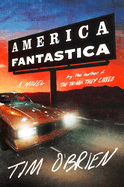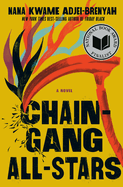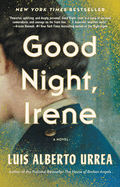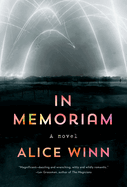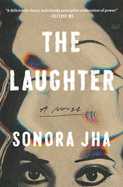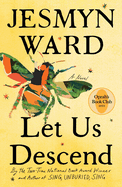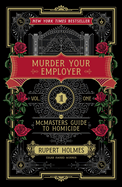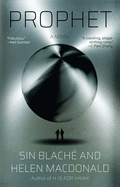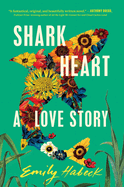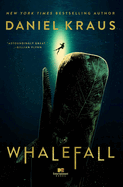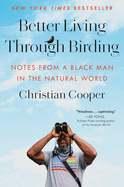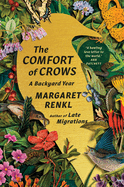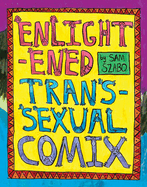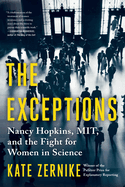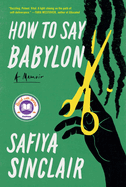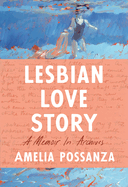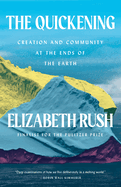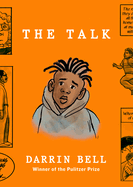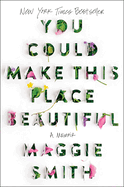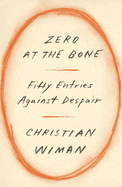Tuesday, November 28, 2023
This year's selection of the 10 Best Fiction and 10 Best Nonfiction adult titles caused us to notice that it's hard to think about life in the present without first reflecting upon the past: Even novels such as Chain-Gang All-Stars and Prophet, while set in a near/alternate future, reckon with the past; and nonfiction like How to Say Babylon, Lesbian Love Story, and The Quickening acknowledge that one must find one's place in the world in part by understanding the historical events that led to this moment. The team at Shelf Awareness once again appreciated such literary companions to escort us through the strange and unpredictable year that was 2023. Click through to see our reviews. (And here are our Best Children's and YA Books of 2023.)
Fiction
America Fantastica by Tim O'Brien (Mariner)
Chain-Gang All-Stars by Nana Kwame Ajdei-Brenyah (Pantheon)
Good Night, Irene by Luis Alberto Urrea (Little, Brown)
In Memoriam by Alice Winn (Knopf)
The Laughter by Sonora Jha (HarperVia)
Let Us Descend by Jesmyn Ward (Scribner)
Murder Your Employer: The McMasters Guide to Homicide by Rupert Holmes (Avid Reader Press)
Prophet by Helen Macdonald & Sin Blaché (Grove Press)
Shark Heart by Emily Habeck (Marysue Rucci Books)
Whalefall by Daniel Kraus (MTV Books)
Nonfiction
Better Living Through Birding: Notes from a Black Man in the Natural World by Christian Cooper (Random House)
The Comfort of Crows: A Backyard Year by Margaret Renkl (Spiegel & Grau)
Enlightened Transsexual Comix by Sam Szabo (Silver Sprocket)
The Exceptions: Nancy Hopkins, MIT, and the Fight for Women in Science by Kate Zernike (Scribner)
How to Say Babylon: A Memoir by Safiya Sinclair (Simon & Schuster)
Lesbian Love Story: A Memoir in Archives by Amelia Possanza (Catapult)
The Quickening: Creation and Community at the Ends of the Earth by Elisabeth Rush (Milkweed)
The Talk by Darrin Bell (Holt)
You Could Make This Place Beautiful: A Memoir by Maggie Smith (One Signal/Atria)
Zero at the Bone by Christian Wiman (Farrar, Straus and Giroux)
America Fantastica
by Tim O'Brien
Set against the backdrop of an unnamed but recognizable American presidency, Tim O'Brien's black comedy, America Fantastica, an Indie Next Pick, takes both the dark and the comic to epic proportions with simultaneous absurdism and poignancy. O'Brien, author of The Things They Carried, offers his first novel in more than 20 years--making it one of the year's most hotly anticipated titles--and he delivers, with a sprawling, madcap tale of road trips, crimes large and small, love, loss, and, most of all, lying.
Readers first meet O'Brien's antihero, Boyd, in action. He departs his Kiwanis brunch early to head to the bank, where he presents a gun and leaves with just under $81,000 and the teller, "a diminutive redhead named Angie Bing." Boyd and Angie hit the road. Their travels prompt movements by an increasingly colorful cast of bizarre characters. These characters and events, in a series of deftly drawn American locales, form a fantasmagoria, a version of reality that both bizarrely exaggerates and digs directly into the emotional truth of the real world. O'Brien demonstrates an electric combination of deadpan humor, vicious wit, and a masterful eye for detail in capturing a peculiarly American form of torment. --Julia Kastner
Chain-Gang All-Stars
by Nana Kwame Adjei-Brenyah
Finalist for the National Book Award, longlisted for many other prizes, and chosen for the Read with Jenna Book Club, Chain-Gang All-Stars by Nana Kwame Adjei-Brenyah (Friday Black) brilliantly exposes the for-profit infrastructure that exploits the incarcerated, as the larger-than-life characters stir compassion in readers. The titular all-stars have signed away their right to privacy, to their names, to their physical likenesses, to compete in gladiator-style fights to the death--televised nationwide. If, after three years, they survive these BloodGround contests, they go free, no matter the length of their sentence.
Loretta Thurwar, in her first contest, upsets the reigning favorite with a mere corkscrew. Eventually, she works her way up from Rookie to highest-rank Grand Colossal. If the situations seem farfetched, such as Grand Colossal Thurwar's "Question Mark" match against 16-year-old prisoner Teacup, they're not; footnotes lay out historical facts: George Stinney, Jr., was executed at age 14 in 1944.
Adjei-Brenyah pulls no punches in the parallels he draws between incarceration and slavery, unpaid labor and power imbalance. In this powerful, imaginative debut novel, the story may be fiction, but Adjei-Brenyah delivers the truth. --Jennifer M. Brown, senior editor, Shelf Awareness
Good Night, Irene
by Luis Alberto Urrea
Serving up "fresh hope with a cup of joy," two Red Cross volunteers accompany frontline troops into the horrors of World War II Europe in Good Night, Irene, an Indie Next Pick, by Luis Alberto Urrea (The House of Broken Angels). They are armed only with coffee urns and a donut fryer, and sustained by an immediate and deep friendship. Irene, fleeing an abusive fiancé in New York, and Dorothy, so enraged by her brother's death at Pearl Harbor that she abandons her family's Indiana farm, commit to serving in a role available to women in 1943--Red Cross Clubmobile staff. They become "a perfect donut-coffee machine" team, entering Europe after D-Day and offering the troops smiles, banter, and what "might be the last blessing from home."
The author, inspired by his mother's Clubmobile service, skillfully portrays the miseries the women endure. A dramatic climax, despite the story's wartime ironies and horrors, offers a ray of hope amid heartbreak. As Dorothy recalls the "Donut Dollies" years later, she tells her granddaughter: "Women are called upon to piece the world back together." --Cheryl McKeon, Book House of Stuyvesant Plaza, Albany, N.Y.
In Memoriam
by Alice Winn
Two English boarding school students in the mid-1910s have nearly everything working against them in Alice Winn's assured debut novel, In Memoriam. Preshute College classmates Henry Gaunt and Sidney Ellwood have advantages. But they're also gay and attracted to one another at a time in Britain in which it is illegal. Then World War I breaks out, an event that has special resonance for part-German Gaunt and Jewish Ellwood. Soon, Gaunt has enlisted, and Ellwood, who is fond of quoting such Tennyson poems as "In Memoriam A.H.H.," reluctantly follows.
Much of this novel takes place on and around battlefields, and depicts the conflicts Gaunt and Ellwood endure--the atrocities of war and the personal challenges of navigating their love. Late in the novel, Ellwood says, "I do think it's peculiar, how much more drawn people are to disaster than to beauty." As Winn instinctively knows, if the goal is to clear a path to beauty, start by eliminating the calamities and prejudices that block the way. --Michael Magras, freelance book reviewer
The Laughter
by Sonora Jha
In her first fiction offering since her 2013 debut novel, Foreign, Sonora Jha (How to Raise a Feminist Son) confronts the inequities inside the Ivory Tower in the astutely provoking, deeply disturbing, and unexpectedly delightful The Laughter.
Her protagonist, Oliver (Ollie) Edward Harding, 56, is a divorced, white, tenured English professor in Seattle. His philandering with colleagues and students was egregious enough, but his sexual violation of his wife cemented their divorce. Lately, Ollie has fallen in lust with recently hired Ruhaba Khan, a law professor specializing in the incarceration of Black women in the U.S. She's a single, independent Pakistani Muslim who chooses to wear a hijab. The 2016 election looms. Clinton's assumed lead doesn't mitigate the palpable undertow of anti-immigrant, anti-terrorist, and particularly anti-Muslim rhetoric. And then Ruhaba's 15-year-old nephew, Adil, arrives from France for an indefinite stay.
Jha is an extraordinary storyteller, aiming her shrewd erudition and humor directly at elitism, sexism, and racism. As Ollie insists that he's "not one to trifle with the truth," his unmistakable delusions, especially of (white, male, privileged) grandeur, provide dazzling fodder for a spectacularly illuminating read. --Terry Hong
Let Us Descend
by Jesmyn Ward
Two-time National Book Award-winner Jesmyn Ward (Men We Reaped; The Fire This Time) delivers a beautifully written and heartrending historical narrative with her fourth novel, Let Us Descend. On a rice plantation in the Carolinas, an enslaved teenager named Annis narrates as she works alongside her beloved mother. Annis's father is the plantation owner who owns her and her mother. When Annis's father chooses to sell her mother south, Annis falls into a near-fatal grief at being left without the most important person in her life, until a kind friend pulls her back to the surface. But soon, Annis and Safi, her friend-turned-lover, are sent on the same walk, a death march to a New Orleans slave market.
Annis's story deals primarily with grief, forces of nature and human evil, villains and allies. As much pain, struggle, torture as there is in these pages, there are also various forms of love, and great strength, power, and personal reclamation. An Oprah Book Club and Indie Next pick, Let Us Descend ends with surprising hope. --Julia Kastner
Murder Your Employer: The McMasters Guide to Homicide
by Rupert Holmes
"Everyone says 'I could just kill so-and-so,' and yet few do anything about it." Perhaps this is because the average person doesn't know how to pull off a homicide or, more importantly, get away with it. That's where Rupert Holmes's cheeky, pun-tastic novel Murder Your Employer: The McMasters Guide to Homicide comes in.
The guide, "edited" by Holmes, is authored by Harbinger Harrow, dean of Admissions and Confessions at McMasters Conservatory for the Applied Arts. Set in the 1950s, the stories follow the education of three students--Cliff Iverson, Gemma Lindley and someone registered as Dulcie Mown--who all have something in common: a desire to kill their despicable employers.
Holmes has pulled off the feat of creating aspiring murderers who are goodhearted and morally decent. Humor, lush surroundings, and sympathetic characters wouldn't be enough if Murder Your Employer--an Indie Next Pick--did not also have clever plotting. Cliff, Gemma and Dulcie must surmount incredible odds to kill their employers, and each devises an intricately complex plan that would challenge even a great detective like the author's namesake, Sherlock Holmes. Warning: readers could die laughing. --Elyse Dinh-McCrillis
Prophet
by Sin Blaché and Helen Macdonald
Helen Macdonald (H Is for Hawk) and Sin Blaché have teamed up for Prophet, a tightly paced, genre-bending tale that imagines the weaponization of nostalgia--and the surreal, horrific threat that poses to the modern world. A diner has appeared in the middle of a British field. Except it's not a real diner--it's more like the memory of one, with the scent of coffee but no coffee makers, a bright neon sign not powered by electricity. It turns out to be gravely dangerous, made from the ever-morphing substance known as Prophet.
Prophet, an Indie Next Pick, is slow to build at first, and a bit confusing at times--a result not of poor writing or worldbuilding, but of the sheer absurd horror of a world shaped by Prophet. Nonetheless, Macdonald and Blaché have created not just unlikely heroes, but an unexpected queer romance, complete with absolutely pitch-perfect banter between the two main characters. Prophet proves a beautiful, tense, strange, and heartfelt first collaboration from a duo not to be missed. --Kerry McHugh, freelance writer
Shark Heart
by Emily Habeck
A woman's life and marriage are upended when her husband undergoes a Kafkaesque transformation in Emily Habeck's strikingly poetic, deeply moving first novel, Shark Heart--an Indie Next Pick and New York Times Editors' Choice. Newlyweds Wren and Lewis expect to have a long, happy marriage, until Lewis notices his nose has grown spongy. The doctor diagnoses him with a Carcharodon carcharias mutation, a condition that will cause Lewis to transform into a great white shark and require relocation to the ocean. Wren, who spent her childhood and young adulthood as her mother's caretaker, cobbles together a saltwater pool and teaches herself scuba diving. Lewis's continually progressing condition will push their marriage to the breaking point, and leave them both struggling to find safe harbor in the face of an unimaginable future.
Habeck's world contentedly defies science and logic. This slightly askew setting allows readers the space to fully engage with elements of loss and mortality. Told in a mixture of formats, including prose, poetry, and theatrical scripts, Shark Heart is a profound, lovely, hopeful interrogation of love and humanity. --Jaclyn Fulwood, blogger at Infinite Reads
Whalefall
by Daniel Kraus
Despite the extensive research and scientific accuracy of his drafting process, Daniel Kraus (The Shape of Water) isn't focused on believability in Whalefall, an emotionally complex thriller that contemplates grief, existence, and family--from within the literal belly of a whale. A year after his father's death, 17-year-old Jay Gardiner combs the ocean floor for lingering bones to comfort his mother and sisters as well as prove he isn't a failure. Diving off the most dangerous beach in California, he plunges over an ocean ledge and encounters a giant squid and its sole natural predator: an ancient sperm whale. The whale ingests the squid and--through tangled limbs and tentacles--Jay himself.
Kraus, mixing flashbacks with an ever-ticking air pressure gauge on Jay's scuba tank, freshly renders a combative father-son dynamic, placing grief in conversation with survival as Jay races to escape the churning viscera of whale innards. With Whalefall, an Indie Next Pick, Kraus deftly explores life's fragility and the ways families fail and save each other--which are as inevitable as the ocean itself. --Kristen Coates, editor and freelance reviewer
Nonfiction
Better Living Through Birding
by Christian Cooper
In Christian Cooper's memoir, Better Living Through Birding--longlisted for the Carnegie Medal--he shares his lifelong passion for birds, including childhood Sunday morning bird walks on Long Island, and his decades of birding in New York City's Central Park. He also describes his experience as a queer Black man: his gradual acceptance of his own identity, his years at Harvard, and his history of activism. (Fellow nerds will especially enjoy Cooper's memories of his time at Marvel Comics, where he helped introduce several groundbreaking gay characters.)
With a keen eye for detail, Cooper presents to readers the birds of Central Park and some of his fellow birding humans, plus a sprinkling of birding tips for novices and what Cooper dubs "the Pleasures of Birding": the joy of sighting an unusual species, the satisfaction of puzzling out a bird's identification, the peace of being out in nature. Cooper skillfully draws together a range of topics and fits them together under the umbrella of birding, savoring nature, and paying attention. Part memoir, part love letter to birding, Better Living Through Birding is a compelling journey in the hands of a capable guide. --Katie Noah Gibson, blogger at Cakes, Tea and Dreams
The Comfort of Crows
by Margaret Renkl
In her luminous third book, The Comfort of Crows--an Indie Next Pick--Margaret Renkl (Graceland, at Last; Late Migrations) takes readers through the details of a year in her Nashville neighborhood. Elegant, lucid essays follow the changing seasons, accompanied by lavishly illustrated mixed-media collages by her brother, Billy Renkl, and invite readers to explore the details of nesting bluebirds, maple trees, garden grubs, sunsets, and Renkl's affection for the birds of the book's title. As she enters a new year, Renkl "cling[s] to the crow's promise of metamorphosis."
Ailing foxes, hungry birds, sunbathing turtles, and her own dog's "Marvelous Nose" remind Renkl and readers to pay attention to winter's denizens. As the calendar turns toward spring, Renkl records various birdsongs, the shifting light and weather, and her own impatience for warmer days. The Comfort of Crows celebrates the beauty and durability of nature's age-old cycles and the habits of wild creatures, and urges human beings to care for them. --Katie Noah Gibson, blogger at Cakes, Tea and Dreams
Enlightened Transsexual Comix
by Sam Szabo
Cartoonist Sam Szabo opens her sidesplitting collection of comic strips with a disarming introduction to the Enlightened Transsexual, a cosmic entity so advanced as to have "experienced life as at least three genders... tantamount to omnipotence." She is brimming with wisdom and willing to entertain the burning questions of mere mortals. It's this mixture of earnestness and egotism that provides the backbone for what is a truly hilarious body of work. Each vignette is a veritable buffeting of punch lines: a census worker at the door learns that the ET's birthplace was primordial ooze, and her orientation is chaotic neutral. These gags are assembled in vibrant and psychedelic drawings that have just the right amount of frenzied verve to nail the irreverent, and sometimes unhinged, sense of humor behind them.
What grounds these comics, though, is a poignant attention to the indignities that trans people face in a world filled with absurdities. Perfectly balanced and ridiculously funny, Enlightened Transsexual Comix is an out-of-this-world parade of earthly delights, for fans of Lynda Barry and Adult Swim. --Dave Wheeler, associate editor, Shelf Awareness
The Exceptions: Nancy Hopkins, MIT, and the Fight for Women in Science
by Kate Zernike
In The Exceptions: Nancy Hopkins, MIT, and the Fight for Women in Science, Pulitzer Prize-winning journalist Kate Zernike expands on her front-page March 1999 Boston Sunday Globe article about MIT's long history of undervaluing its female faculty. This is an in-depth, revelatory, enraging and ultimately triumphant account of a group of women who brought to light the insidious ways in which bias undermined their careers in science. Surprisingly, MIT's admission was not the result of a lawsuit, but rather because 16 women, "who had started as strangers, working in secret, and gathered their case so methodically--like the scientists they were--that MIT could not ignore them." Leading the charge was Nancy Hopkins, a molecular biologist who was trying to identify the genes essential for development. When she requested more room for her zebrafish tanks, she was denied. So Hopkins painstakingly measured every square inch of the laboratories in her building, bringing hard data to the dean showing that on average the male faculty had much more lab space than their female counterparts.
Hopkins granted Zernike access to the papers she'd kept during this time, and the result is an intimate look at her life and career, at a time when "unconscious bias" was not yet in common parlance. In Zernike's hands, this is a thrilling story: we know the outcome, but the ride is both frustrating--how could Hopkins put up with this for so long?--and then exhilarating when she becomes radical in her fight for equality. --Marilyn Dahl
How to Say Babylon: A Memoir
by Safiya Sinclair
Poet Safiya Sinclair (Cannibal) once again dazzles readers with her memoir How to Say Babylon, flavored as much by the shimmering promise of the future as it is a backward gaze at the author's history.
The eldest of four, Sinclair was born in Montego Bay, Jamaica, and raised by Djani, a fervent Rasta musician from the countryside, and Esther, his ethereal, intelligent wife. Her parents both had "shoulder-length natty Congo Bongo dreadlocks" and started their family while living at Esther's childhood seaside home. Sinclair's father, with his magnetic personality, beautiful voice, and "his dreadlocks falling like dark vines," was the troubled root of their family. He had become no different than the systemic powers that he railed against: imposing through violence and verbal abuse his own absolute rule over them, forcibly shielding them from the wiles of "Babylon"--Western society and culture--which he considered dangerous and corrupt.
Sinclair knows that if she wants to forge ahead with a life of her own making, she must first reconcile with the past, and "write the ache into something tangible." A Read with Jenna Today Show Book Club and Indie Next Pick, How to Say Babylon is also a historical drama, shedding light on the rise of an Afrocentric, decentralized Rastafari faith in a Jamaica confused about its post-colonial identity. Readers will marvel at the tenderness that defines the author's approach to her troubled childhood, and the strength with which she embraces a future certain to be gilded by the extraordinary imagery of her poetry. --Shahina Piyarali
Lesbian Love Story
by Amelia Possanza
In her audacious heartthrob of a memoir, Amelia Possanza revives seven queer romances from the past, hoping to better understand her own lesbian identity. "I was certain that if I uncovered enough lesbians in history, they would reveal... a blueprint of how I might build my own life," she writes in her introduction. What she discovers, however, by scouring libraries for figures obscured by historical bias, is nothing so prescriptive. She finds an expansive and adaptable collective that spans centuries and includes female husbands, drag kings, Olympic athletes, political activists, caregivers, and more.
Possanza converses with these historical lesbians through a dazzling approach to shared text, injecting her prose with their preserved words, transferred from diaries and interviews. She lays bare her own yearnings and insecurities alongside those of her forebears in a moving assertion of belonging. Her vulnerability is matched only by her sense of joy in discovering an ongoing and shifting discussion about "women who love women" and others who exist outside of such easy definitions, while persevering with a distinctly lesbian worldview. Lesbian Love Story is a triumph, as romantic as it is perceptive. --Dave Wheeler, associate editor, Shelf Awareness
The Quickening: Creation and Community at the Ends of the Earth
by Elizabeth Rush
Elizabeth Rush, Pulitzer Prize finalist for Rising: Dispatches from the New American Shore, is no stranger to chronicling difficult narratives about climate change, and conveys profound urgency without ever descending into panic. In The Quickening: Creation and Community at the Ends of the Earth, an Indie Next Pick, she turns that skill to a most daunting task: joining the crew of the Nathaniel B. Palmer and the team of scientists attempting to gather data from Antarctica's never-before-explored Thwaites Glacier. She divides the book into four acts, and opens with a cast of characters, including the glacier itself ("the most important character in this play"). Rush eschews the expected here, interrupting narrative passages with fragmented dialogues lifted from the countless interviews she conducted with those on board--and weaving through it all her own story of becoming a mother.
Rush is a journalist, with a scientist's curiosity and powers of observation, but she is also a poet. As impressive as the structure is, it's at the sentence level that Rush's artistry shines, each description a pearl, and the string of them a thing of undeniable beauty. --Sara Beth West, freelance reviewer and librarian
The Talk
by Darrin Bell
In The Talk, Pulitzer Prize-winning cartoonist Darrin Bell delivers an intimate, incisive depiction of coming of age as a Black boy in the United States. This full-length graphic memoir debut about growing up, building a career in the public eye, and raising a family begins and ends with "The Talk," in which parents teach their Black children about anti-Blackness: why the people and institutions they encounter will treat them differently, and how to try to stay safe in a racist world.
In a style quite different from Bell's syndicated editorial cartoons and comic strips, The Talk is illustrated with inks primarily washed with deep blue or tan. Color is employed strategically: the dark blue-gray, initially seen on aggressive neighborhood dogs from his childhood, haunts Darrin through the pages; while occasional full-color images attract the reader's eye. When Trayvon Martin is murdered, for example, the word "thug" is written in red over white text that reads "child."
Bell has mastered the art of distilling powerful messages into just a few panels. Shortlisted for the Andrew Carnegie Medal and named one of the Washington Post's 10 best graphic novels of 2023, and one of Time magazine's Must-Read Books of the Year, The Talk speaks to a wide audience, with humor (which Bell used early on as a form of self-defense) and wisdom accrued through experience. This is a depiction of one man's journey to unlearn the Black exceptionalism programming instilled in him by society and to find his authentic voice in the process. --Suzanne Krohn
You Could Make This Place Beautiful: A Memoir
by Maggie Smith
"This isn't a tell-all," poet Maggie Smith (Goldenrod; Keep Moving) writes in the opening pages of her brilliant, beautiful memoir, You Could Make This Place Beautiful. It can't be, she argues, because she is not an omniscient narrator, she cannot know all, and because some of what she offers in the pages that follow is, in fact, an account of what she does not know. It's a "tell-mine" instead, a version of the pain and hardship brought on by the dissolution of her marriage--but also found in the marriage itself, in a life spent making herself small enough to fit inside of an institution and a partner that did not serve her, not really, or offer room for growth and expansion.
An Indie Next Pick, You Could Make This Place Beautiful makes a gift out of Smith's pain, tied up not in a neat bow, but offered with grace, humility and wonder as something to be treasured and held up gently, to see what it may reflect of ourselves when it touches the light. --Kerry McHugh, freelance writer
Zero at the Bone: Fifty Entries Against Despair
by Christian Wiman
Zero at the Bone: Fifty Entries Against Despair by poet Christian Wiman (Hammer Is the Prayer; Once in the West) serves as counterbalance to a world inclined to confident statements and loud rally cries. It claims little certainty, choosing instead to focus on the universal and the ineffable in its mélange of critical essays, personal anecdotes, quoted passages, and poems.
The essays are full of insights on poets like Lucille Clifton or Emily Dickinson, but the poems punctuating those longer entries are the thing. They exceed every expectation, offering light and sound and silence, as seen in lines from "Ars Poetica," a poem in two parts: "--a plum and othering dusk/ something renunciatory in the light,/ until the sparrow takes the old tree's shape/ and the trees untreed are everywhere./ If I could let go/ If I could know what there is to let go/ If I could chance the night's improvidence/ and be the being this hard mercy means." Similar to a commonplace book, Zero at the Bone is an uncommon work from an uncommonly beautiful mind, full of compassion and built of dazzling intellect. --Sara Beth West, freelance reviewer and librarian
Great Reads
Great Gifts
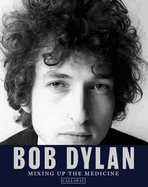 Did you miss Shelf Awareness's Adult Gift Issue? From Bob Dylan: Mixing Up the Medicine by Mark Davidson and Parker Fishel, which "brilliantly showcases hundreds of photos and objects" from the Bob Dylan Center, to the "visually stunning" The New Brownies' Book, in which Karida L. Brown and Charly Palmer continue what W.E.B. Du Bois began in his monthly magazine The Brownies' Book, there's something for every interest.
Did you miss Shelf Awareness's Adult Gift Issue? From Bob Dylan: Mixing Up the Medicine by Mark Davidson and Parker Fishel, which "brilliantly showcases hundreds of photos and objects" from the Bob Dylan Center, to the "visually stunning" The New Brownies' Book, in which Karida L. Brown and Charly Palmer continue what W.E.B. Du Bois began in his monthly magazine The Brownies' Book, there's something for every interest.
Book Candy
Book Candy
Mental Floss offered "10 Fascinating Facts About Louisa May Alcott."
---
Merriam-Webster's Word of the Year for 2023: "authentic."
---
Open Culture shared "Leonardo da Vinci's handwritten resume (circa 1482)."
Great Reads
Gifts for Cooks
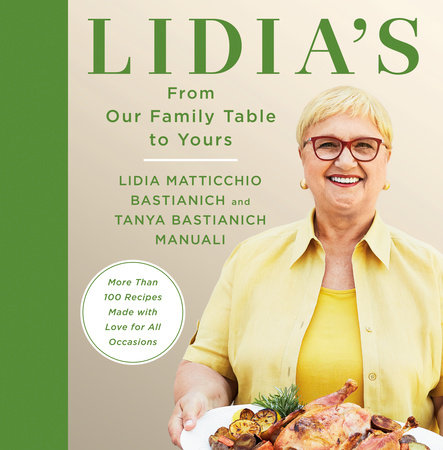 Need more gift ideas? Check out Shelf Awareness's Cookbook Gift Issue--we have something for every appetite, whether it's Nik Sharma's Veg-Table for vegetarians (and vegetable-lovers in general) or Not That Fancy, Reba McEntire's combination approach to living, dining and relaxing with loved ones. And don't miss The Writer's Life with Lidia Bastianich, who reveals her favorite family recipes in Lidia's from Our Family Table to Yours.
Need more gift ideas? Check out Shelf Awareness's Cookbook Gift Issue--we have something for every appetite, whether it's Nik Sharma's Veg-Table for vegetarians (and vegetable-lovers in general) or Not That Fancy, Reba McEntire's combination approach to living, dining and relaxing with loved ones. And don't miss The Writer's Life with Lidia Bastianich, who reveals her favorite family recipes in Lidia's from Our Family Table to Yours.



